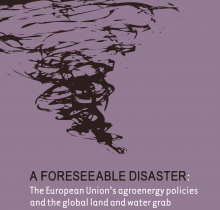
Published by Transnational Institute, FDCL and Econexus for Hands off the Land Alliance
Why despite ten years of accumulating evidence on the social and environmental cost of agrofuels, does the European Commission persist with its failed policies? An analysis of the EU's bioeconomy vision, how it is fuelling land grabs in Africa, the agrofuels lobby that drives policy, and the alternative visions for energy that are being ignored. On the eve of the new millennium, the EU embarked upon a major agroenergy and bioeconomy experiment. More than ten years on, the evidence from science, academia, and grassroots voices is clear: most of the claims initially made for agroenergy as a truly renewable alternative to fossil fuels are flawed. Worst of all, the creation of an EU market for industrial agrofuels has been shown to have a negative impact on the land and resource rights, livelihoods, and food security of local populations, especially in the global South. Our primary obligation in Europe is to reduce energy consumption, in particular that which has an impact on other regions, and change our current energy dense development model. Agroenergy does not qualify as renewable energy and the EU agroenergy policy framework should therefore be dismantled.
EXECUTIVE SUMMARY
On the eve of the new millennium, the EU embarked upon a major agroenergy and bioeconomy experiment. More than ten years on, the evidence from science, academia, and grassroots voices is clear: most of the claims initially made for agroenergy as a truly renewable alternative to fossil fuels are flawed. Indeed, reports and research continue to demonstrate problems with the policy’s most basic assumptions. Worst of all, the creation of an EU market for industrial agrofuels has been shown to have a negative impact on the land and resource rights, livelihoods, and food security of local populations, especially in the global South. These same concerns hold true for agromass. But despite the accumulating evidence, the European Commission (EC) is persisting with its agroenergy policies, resolutely refusing to drop targets that were demanded by industry from the outset to provide security of investment in the sector. The reason why so many sound arguments against agrofuels and agromass are being ignored, is that behind the EC’s promotion of agrofuels and agromass is a powerful industrial lobby that includes the motor industry, the oil industry and the various energy industries. The grand plan for a bioeconomy appropriates renewable biological resources to facilitate a market-based, techno-centric response to unsustainable energy patterns.
Critically analysing the origins, claims, and effects of the European Union’s (EU) transition to a new bioeconomy, this report aims to contribute to challenging this strategy. It highlights how EU policy is contributing to a reordering of land and land use, with a particular focus on Africa. One aspect of the non-renewable nature of agroenergy with special relevance to this paper is that it requires more land per unit of energy than other forms of energy supply. To date the EC has proposed that EU agrofuel policy can be amended or adjusted to actually reduce emissions and not have negative impacts on third countries. This merely helps to perpetuate a policy that is based on false assumptions and claims, a policy that has failed on its own terms. Civil society needs to increase the pressure and shift the onus to the companies to prove that they are not destroying forests and livelihoods. Our primary obligation in Europe is to reduce energy consumption, in particular that which has an impact on other regions, and change our current energy dense development model. Agroenergy does not qualify as renewable energy and the EU agroenergy policy framework should therefore be dismantled.
